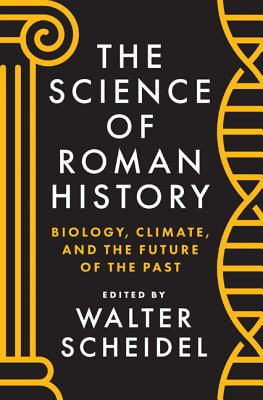

 Princeton University Press
Princeton University Press
The Science of Roman History: Biology, Climate, and the Future of the Past


Key Metrics
- Walter Scheidel
- Princeton University Press
- Hardcover
- 9780691162560
- 9.4 X 6.3 X 1 inches
- 1.2 pounds
- History > Ancient - Rome
- English
 Secure Transaction
Secure TransactionBook Description
How the latest cutting-edge science offers a fuller picture of life in Rome and antiquity
This groundbreaking book provides the first comprehensive look at how the latest advances in the sciences are transforming our understanding of ancient Roman history. Walter Scheidel brings together leading historians, anthropologists, and geneticists at the cutting edge of their fields, who explore novel types of evidence that enable us to reconstruct the realities of life in the Roman world.
Contributors discuss climate change and its impact on Roman history, and then cover botanical and animal remains, which cast new light on agricultural and dietary practices. They exploit the rich record of human skeletal material--both bones and teeth--which forms a bio-archive that has preserved vital information about health, nutritional status, diet, disease, working conditions, and migration. Complementing this discussion is an in-depth analysis of trends in human body height, a marker of general well-being. This book also assesses the contribution of genetics to our understanding of the past, demonstrating how ancient DNA is used to track infectious diseases, migration, and the spread of livestock and crops, while the DNA of modern populations helps us reconstruct ancient migrations, especially colonization.
Opening a path toward a genuine biohistory of Rome and the wider ancient world, The Science of Roman History offers an accessible introduction to the scientific methods being used in this exciting new area of research, as well as an up-to-date survey of recent findings and a tantalizing glimpse of what the future holds.
Author Bio
Walter Scheidel's research ranges from ancient social and economic history and premodern historical demography to the comparative and transdisciplinary world history of inequality, state formation, and human welfare. He is particularly interested in connecting the humanities, the social sciences, and the life sciences.
The world's second most cited Roman historian in an active faculty position, Scheidel is the author or (co-)editor of 20 books, has published more than 250 articles, chapters, and reviews, and has lectured in 30 countries.
His most recent books are The Oxford World History of Empire (2 vols., 2021, co-edited with Peter Bang and the late Christopher Bayly), Escape from Rome: The Failure of Empire and the Road to Prosperity (2019), The Science of Roman History: Biology, Climate, and the Future of the Past (2018, ed.), The Great Leveler: Violence and the History of Inequality from the Stone Age to the Twenty-First Century (2017; 12 translations), On Human Bondage: After Slavery and Social Death (2017, co-edited with John Bodel), State Power in Ancient China and Rome(2015, ed.), and Fiscal Regimes and the Political Economy of Premodern States (2015, co-edited with Andrew Monson). Other key publications include Rome and China: Comparative Perspectives on Ancient World Empires (2009, ed.), The Cambridge Economic History of the Greco-Roman World (2007, co-edited with Ian Morris and Richard Saller), and Death on the Nile: Disease and the Demography of Roman Egypt (2001).
He has also written for the New York Times, Financial Times, Atlantic, Economist, Le Monde, Foreign Affairs, Boston Globe, Huffington Post, Spectator, and other media outlets.
Scheidel is currently working on the Roman monarchy in global comparative context and on a very short book on the past, present and future of the study of ancient history, and is planning longer works on counterfactual history, on typological and evolutionary perspectives on the ancient world, and on how modernizing developmental discontinuities enrich, divide and threaten humankind. He launched an international research initiative for the comparative study of ancient Mediterranean and Chinese empires, co-founded the Princeton/Stanford Working Papers in Classics, created the interactive web site Orbis: The Stanford Geospatial Network Model of the Roman World, which has received over a million visits and attracted global media coverage, and is an editor of the monograph series Oxford Studies in Early Empires and a former editor of the journal Historia.
For about a decade, Scheidel taught as a Catherine R. and Daniel L. Grossman Fellow in Stanford's Human Biology program. He was awarded a New Directions Fellowship by the Mellon Foundation and a Guggenheim fellowship, and is a Corresponding Member of the Austrian Academy of Sciences.
Source: Stanford University Department of Classics
Videos
No Videos
Community reviews
Write a ReviewNo Community reviews